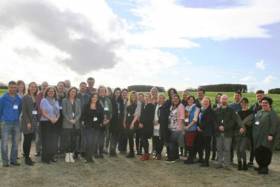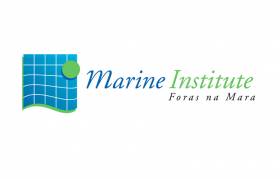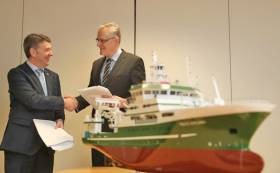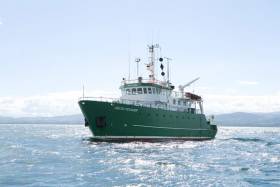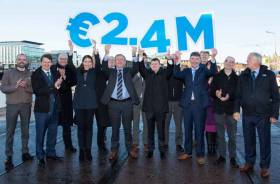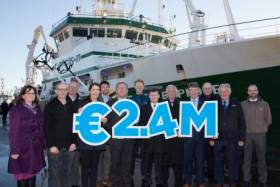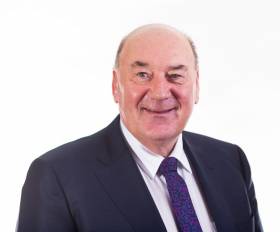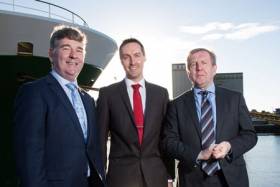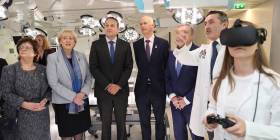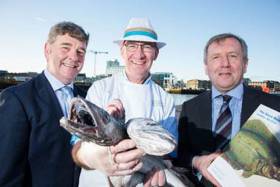Displaying items by tag: Marine Institute
Irish Ocean Literacy Network Meeting Shapes The Conversation About Our Oceans & Human Health
The Irish Ocean Literacy Network held its sixth national meeting last Wednesday 20 February at the Marine Institute in Galway, where keynote speakers Dr Easkey Britton — surfer and post doc fellow at NUI Galway — and filmmaker Ken O’Sullivan of Sea Fever Productions spoke about the importance the ocean has on our lives as islanders.
Speaking at the event as chair, Cushla Dromgool-Regan of the Marine Institute welcomed having two distinguished guest speakers, highlighting the importance of recognising Ireland’s rich maritime heritage and being able to share our stories.
“As an island nation we are extremely lucky to have a wealth of experts from all walks of life willing to share their experiences with the wider marine community,” she said.
“From being able to see a whale and its calf close up in Irish waters through Ken’s film work, to watching children learning to surf for the first time with Easkey, reminds us of the diversity and importance of our maritime heritage and looking after our ocean for future generations.”
Easkey Briton is widely recognised for her international achievements in surfing is currently completing a post-doctoral research fellow with the EU-Horizon 2020 project Seas, Oceans and Public Health in Europe (SOPHIE).
Growing up in a family of surfers, Easkey talked about how her life passion for the water has brought her in a full cycle, where much of her research as a social scientist has been about the environment and society.
“Bringing people together through community outreach to working with a range of stakeholders in my current research highlights how we all value the ocean in different ways, yet together we all seem to understand the importance of linking our ocean with human health,” Easkey said.
Filmmaker Ken O’Sullivan also spoke at the event sharing his love of the ocean. Coming from a family of fishermen and then learning to dive opened up a new world of discovery for Ken at a young age, where he stated “exploring the ocean as a child with no limitations was like living the life to what might be similar to Huckleberry Finn. Now making a career out of filming wildlife and creative documentaries in the most extreme environments has been a life of adventures.”
Ken O’Sullivan set up Sea Fever Productions in 2006 with Katrina Costello to produce wildlife and creative documentaries. In 2018 they produced Ireland’s Deep Atlantic, a hugely ambitious ocean natural history series searching for blue whales and cold water coral reefs in the deep waters of the North Atlantic, documenting habitats and whale and shark behaviour for the first time ever.
“I have worked with a range of people who have contact with the ocean from fishermen, whale watchers to marine researchers and scientists during their deep sea expeditions, [and] coupled with the development of filming technology, [it] has provided an incredible opportunity to capture footage of marine life right at our doorstep,” Ken said.
“The feedback from the public who have seen my work has been extremely rewarding, particularly from those who are seeing marine life in Irish waters for the first time.”
With a wide range of ocean champions promoting ocean engagement across the island of Ireland, the Irish Ocean Literacy Network says it has seen a significant growth in the last six months, with nearly 100 members representing individuals, small businesses, outreach and education specialists, researchers, NGOs, State agencies and Government departments throughout Ireland.
Garry Kendellen, secretariat of the network, said: “With the recent growth of the IOLN membership, it is encouraging see a sense of the ocean community in one room.
“Our network is a truly eclectic mix of people, who share a similar passion for the ocean. From community outreach to larger national collaborations, it is great to see so many members willing to share their experiences with the network, providing advice and inspiring new collaborations and ideas.”
During the strategic workshop run by David Murphy of AquaTT, he noted: “As an island nation we are in a unique position to help contribute to the national and international efforts to increase peoples understanding and engagement about the ocean.
“We are all individuals who bring something new to the network, yet working together as a collective highlights the importance of creating impactful actions and messaging promoting our ocean from coast to coast.”
The Irish Ocean Literacy Network holds four membership meetings per year where attendees are able to meet other ocean champions who are keen to raise awareness and engagement about the ocean in Ireland. Membership is currently free and if you are interested in learning more, contact [email protected].
The Marine Institute are funders of the Irish Ocean Literacy Network secretariat, which was awarded to Galway Atlantaquaria from 2018-2020. This aims to supports the institute’s Strategic Plan 2018-2022, Building Ocean Knowledge – Delivering Ocean Services, as well as the Government’s marine strategy Harnessing Our Ocean Wealth, whereby it aims to increase awareness of the value, opportunities and societal benefits of our ocean, as well as raising peoples engagement with the ocean.
Robotics, Internet of Things and data analytics are set to play a key role in Ireland's blue economy, according to the Marine Institute.
The national funding agency for the marine research industry recently awarded financial investments in two marine technology projects led by Xocean and IDS Monitoring.
Louth-based marine technology firm Xocean has been awarded €199,739 in funding over two years to transform marine monitoring and data collection.
The company uses innovative robotics, particularly unmanned vehicles, and IoT technology to monitor and collect data at sea.
Elsewhere, a new smart data buoy project by Clare-based IDS Monitoring will also benefit from a €196,955 funding grant, to develop a new smart buoy for coastal and inshore environmental monitoring.
The new IDS Buoy will make it easier to assemble, deploy and use buoys, as well as reducing purchase costs and maintenance, whilst enhancing the value of the information delivered through the smart buoy.
Recently announced by the Department of Agriculture, Food and Marine, the industry-led awards support Ireland's Integrated Marine Plan, Harnessing Our Ocean Wealth, as well as the national Marine Research and Innovation Strategy 2017-2021.
“Supporting Irish companies in the marine sector, through research grants, helps to accelerate innovation and drive growth in our blue economy,” said Marine Institute chief executive Dr Peter Heffernan.
“The Marine Institute is committed to assisting industry-led development through knowledge transfer, capacity building and research to enable optimal decision making and planning to best leverage our natural marine resources sustainably and efficiently.
“Both advanced technology research projects funded through the Marine Institute have the potential to be globally significant, and present enormous commercial opportunities for these Irish marine enterprises.
“Increased economic growth and job creation from small and medium sized enterprises based in Ireland is a key component of several national strategies and regional development plans.
“These awards will be carried out with the support of the Marine Institute under the Marine Research Programme 2014-2020 funded by the Irish Government, co-financed by the European Regional Development Fund.”
#MarineScience - Ship design consultants Skipsteknisk AS of Ålesund, Norway have been awarded the contract to design the new state-of-the-art marine research vessel for Ireland.
The new 50m research vessel due in 2022 will replace the RV Celtic Voyager and will be a sister ship to Ireland’s largest research vessel, the 65m RV Celtic Explorer.
It will also form a critical part of the State’s maritime infrastructure, supporting the Government’s national integrated marine plan, Harnessing Our Ocean Wealth, as well as the National Marine Research and Innovation Strategy.
In the more immediate term, the new vessel will help address research challenges resulting from Brexit and the Common Fisheries Policy, as well as climate-induced impact on the oceans.
“There are many challenges posed and threats in relation to our oceans and research is an intrinsic part of formulating a sustainable approach to the use, understanding and management of our oceans,” said Marine Minister Michael Creed.
“The funding of the new vessel demonstrates the Government’s commitment to expanding and strengthening marine science in Ireland to ensure our nation is equipped with the best scientific advice possible to enable a strong negotiating position and to maximise economic opportunities in a sustainable manner.”
Dr Peter Heffernan, chief executive of the Marine Institute, welcomed the signing of the research vessel design contract following an extensive EU tender process.
“The institute is on track and on budget with the design of the new vessel, which will provide critical national infrastructure and marks a major milestone in the Marine Institute's efforts to provide world-class marine science.
“The significantly enhanced capabilities of the new research vessel will help researchers, educators, students and the public gain a richer understanding of our ocean and will facilitate exploration that will lead to discoveries that stretch the bounds of our imagination.
Dr Heffernan added that “this significant investment in the nation’s scientific research recognises the Marine Institute's quarter-century of leadership in the field of oceanography and its long-standing and fruitful collaborations with partner institutions.
“The new vessel will enable us all to more efficiently explore, collaborate, and conduct global ocean research.”
Based in Galway, the vessel will be used by the Marine Institute and other State agencies and universities to undertake fisheries research, seabed mapping, oceanographic and environmental research and surveys, as well as student training.
It will also allow for continued transatlantic surveys with international partners through the Atlantic Ocean Research Alliance (AORA) and EU funded-survey programmes obtained through Horizon 2020.
Skipsteknisk AS are specialists in the design of highly advanced ships and are recognised internationally as leading designers in the research, fishing and offshore sectors.
The nature of marine equipment has changed significantly since the launch of Ireland’s first research vessel, the RV Celtic Voyager back in 1997
That’s according to Mick Gillooly, director of ocean science and information services with the Marine Institute.
“The new research vessel will be 50m long and will feature state-of-the-art technologies enabling a wide range of work including ocean monitoring, fish stock assessment and seabed surveying. This new vessel will be a silent research vessel, and will be designed to meet the stringent criteria of the ICES 209 noise standard for fisheries research.
“In addition, the vessel will be designed to operate in the harsh conditions encountered in the NE Atlantic and will be able to spend 21 days at sea. It will also support the remotely operated vehicle (ROV) and autonomous underwater vehicle operations, which enable the exploration of our deep ocean down to 3,000m.”
Once the design phase is complete, the next phase is to tender for a shipyard to construct the vessel. This is expected to be complete by the end of this year, with delivery of the new vessel expected in early 2022.
Applications Close Tomorrow For Eurofleets Plus Temporary Team Leader Role With Marine Institute
There’s still time to apply for the Marine Institute’s vacancy for a temporary team leader for its Eurofleets Plus and Marine Robots projects.
Applications close at noon tomorrow, Monday 28 January for the position, in which the successful candidate will act as project manager for the Eurofleets Plus project.
Eurofleets Plus is a four-year advanced community research infrastructure project which has been awarded funding via Horizon 2020, and aims to unify oceanic research fleets across Europe for shared purposes and common goals.
Among other requirements, the Marine Institute is looking for applicants with degree in a scientific or technical subject am with a proven background in working in marine research projects, ideally in a co-ordination capacity.
The Marine Institute website has more on the role and how to apply HERE.
Marine Institute €2.4m Investment in Industry-Led Marine Projects
Twelve marine SMEs are to benefit from funding provided for the National Marine Research and Innovation Strategy (2017-2021).
The Minister for Agriculture, Food and Marine, Michael Creed TD has announced that the Marine Institute is to provide twelve marine businesses (in collaboration with five universities) with investment funding totalling €2.4 million over 3 years. The funding is being provided to drive continued innovation in Ireland’s ocean economy, a key requirement of the Marine Institute led, National Marine Research and Innovation Strategy (2017-2021). The twelve grants of up to €200,000 each which are being provided to individual companies and company-led consortia will support novel R&D and the development of new technologies in key growth areas such as marine engineering, renewable energy and the blue bioeconomy.
Minister Creed said, “Ireland’s blue economy continues to grow and develop in line with the targets of the national integrated marine plan, Harnessing Our Ocean Wealth. Indigenous small and medium enterprises are identifying new commercial opportunities across a range of marine sectors which can lead to economic growth and new jobs. These industry-led awards provide the opportunity for companies to build their R&D capacity and to innovate towards new products and processes. I look forward to seeing the twelve successful companies develop and grow their businesses with the support of this significant public investment funding.”
Marine Institute CEO Dr. Peter Heffernan said, “The Marine Institute is committed to assisting industry-led development through knowledge transfer, capacity building, research and Innovation. This investment in industry-led research is a key deliverable of the Marine Institute Strategic Plan 2018-2022: Building Ocean Knowledge, Delivering Ocean Services. Job creation in the marine sector is increasing as a result of such investment and Irish marine companies have built an excellent reputation internationally for innovation and best practice. The 12 companies receiving funding through this funding call have demonstrated the demand and capability to fuel further growth through marine research,”
Increased economic growth and job creation from small and medium sized enterprises based in Ireland is a key component of several national strategies and regional development plans. These awards will be carried out with the support of the Marine Institute under the Marine Research Programme 2014-2020 funded by the Irish Government, co-financed by the European Regional Development Fund (ERDF).
A diverse range of companies applied to the Marine Institute, following the launch of its Industry-led call in May 2018. Awards have been approved for companies operating in a range of marine sectors including companies such as SolarMarine Energy, Gavin & Doherty Geosolutions, Subsea Micropiles, Marine Materials Ltd, Exceedence Ltd, w1Da Experience and Resolute Marine. Bioresources processing company, Bio-marine Ingredients Ltd, was awarded funding, while advanced technologies companies, Xocean Ltd and IDS Monitoring and marine engineering companies Technology from Ideas and Ocean Energy were also successful in their funding applications. See full list of grants awarded below.
|
Project Title |
Lead Organisation (Company) |
Project Partners |
Total Project Funding Awarded |
Main Research Theme (National Marine R&I Strategy) |
|
Development of marine functional food to support muscle health and healthy aging in older adults |
Bio-marine Ingredients Ireland Ltd |
Dublin City University & University of Limerick |
€200,000 |
Bioresources: Processing for Food & Other Use |
|
Aquamoor |
Technology From Ideas Ltd |
Not Applicable |
€199,960 |
Bioresources: Aquaculture |
|
A Morphodynamic Study of the Irish Sea |
Gavin & Doherty Geosolutions |
University College Cork |
€199,957 |
Renewable Energy |
|
Development of the next generation fisheries surveys using a "swarm" of Unmanned Surface Vessels |
Xocean Limited |
Not Applicable |
€199,739 |
Advanced Technologies |
|
Floating Solar Hybrid Energy Project |
SolarMarine Energy Ltd |
University College Cork |
€195,465 |
Renewable Energy |
|
Eureka-SeaWind: A lighter, more cost-effective solution for floating offshore wind |
Marine Materials Ireland Ltd |
Not Applicable |
€199,816 |
Renewable Energy |
|
The IDS Smart buoy Project |
IDS Monitoring Ltd |
Not Applicable |
€196,275 |
Advanced Technologies |
|
OWSC - Designing for Manufacture, Deployment, Operation, Maintenance and Decommissioning |
Resolute Marine |
Not Applicable |
€199,955 |
Renewable Energy |
|
Development of Micropile Technology for Subsea Environment |
Subsea Micropiles Ltd |
Not Applicable |
€199,902 |
Renewable Energy |
|
1kW Inline Gator - aquaculture application |
Exceedence Ltd |
Technology From Ideas Ltd |
€199,532 |
Renewable Energy |
|
Engineering Advanced Materials for Marine Energy and Aquaculture applications. |
Ocean Energy Ltd. |
NUI Galway |
€195,565 |
Engineering |
|
Marine EcoPowa Project |
w1Da Experience Ltd |
University College Cork & University of Southampton |
€198,763 |
Renewable Energy |
Total Grant-Aid Funding Awarded €2,384,929
Minister Announces €2.4m Investment By Marine Institute In Industry-Led Marine Projects
Marine Minister Michael Creed TD has announced that the Marine Institute is to provide 12 marine businesses (in collaboration with five universities) with investment funding totaling €2.4 million over three years.
Read the full allocation of the grant recipients here
The funding is being provided to drive continued innovation in Ireland;s ocean economy, a key requirement of the Marine Institute-led National Marine Research and Innovation Strategy 2017-2021.
The 12 grants of up to €200,000 each, which are being provided to individual companies and company-led consortia, will support novel R&D and the development of new technologies in key growth areas such as marine engineering, renewable energy and the blue bioeconomy.
Minister Creed said: “Ireland’s blue economy continues to grow and develop in line with the targets of the national integrated marine plan, Harnessing Our Ocean Wealth.
“Indigenous small and medium enterprises are identifying new commercial opportunities across a range of marine sectors which can lead to economic growth and new jobs. These industry-led awards provide the opportunity for companies to build their R&D capacity and to innovate towards new products and processes.
“I look forward to seeing the 12 successful companies develop and grow their businesses with the support of this significant public investment funding.”
Marine Institute chief executive Dr Peter Heffernan added: “The Marine Institute is committed to assisting industry-led development through knowledge transfer, capacity building, research and innovation. This investment in industry-led research is a key deliverable of the Marine Institute Strategic Plan 2018-2022: Building Ocean Knowledge, Delivering Ocean Services.
“Job creation in the marine sector is increasing as a result of such investment and Irish marine companies have built an excellent reputation internationally for innovation and best practice. The 12 companies receiving funding through this funding call have demonstrated the demand and capability to fuel further growth through marine research.”
Increased economic growth and job creation from small and medium-sized enterprises based in Ireland is a key component of several national strategies and regional development plans. These awards will be carried out with the support of the Marine Institute under the Marine Research Programme 2014-2020 funded by the Government, co-financed by the European Regional Development Fund (ERDF).
A diverse range of companies applied to the Marine Institute, following the launch of its industry-led call in May 2018.
Awards have been approved for companies operating in a range of marine sectors including companies such as SolarMarine Energy (€195,465 for a floating solar hybrid energy project), Gavin & Doherty Geosolutions (€199,957 for a morphodynamic study of the Irish Sea), Subsea Micropiles (€199,902 for development of micropile technology in subsea environments), Marine Materials Ltd (€199,816 for its Eureka-SeaWind offshore wind energy project), Exceedence Ltd (€199,532 for its inline gator for aquaculture), w1Da Experience (€198,763 for its marine EcoPowa project) and Resolute Marine (€199,955 for its oscillating wave surge converter design).
Bioresources processing company Bio-marine Ingredients Ltd, was awarded €200,000 for the development of marine functional food to support healthy ageing in older adults, while advanced technologies companies Xocean Ltd (€199,739 for fisheries surveys using ‘swarms’ of unmanned vessels) and IDS Monitoring (€196,275 for its ‘smart buoy’ project), and marine engineering companies Technology from Ideas (€199,960 for the Aquamoor sustainable mooring for shellfish and seaweed) and Ocean Energy (€195,565 for engineering advanced material for marine energy and aquaculture) were also successful in their funding applications.
John Killeen Reappointed as Chairperson of The Marine Institute
The Minister for Agriculture, Food and the Marine, Michael Creed, T.D., has re-appointed Dr. John Killeen as Chairperson of the Marine Institute for a five-year term with effect from January 8th 2019. Dr Killeen was originally appointed for a five year term in 2014.
Announcing the appointment, the Minister thanked Dr Killeen for his valuable contribution over the past five years and said; “I am pleased that John has accepted this re-appointment as he has the essential experience and knowledge necessary to continue to lead the Board of the Marine Institute and ensure it has the necessary skills to deliver on its key role as the national agency for marine research, technology, development and innovation”.
Dr John Killeen is an engineer by profession and a native of Co Roscommon, he became an Honorary Freeman of Galway City in 2012. During a long and diverse career, he has worked on significant Local Government projects and worked with large engineering firms internationally. Dr Killeen was President of Engineers Ireland from 1995-1996 and founding President of the Academy of Engineering in Ireland in 1996-1998. He received an outstanding Lifetime Award for his contribution to Irish Engineering in 2013. He is a retired CEO of Colas Group in Ireland and a retired managing director of Cold Chon Galway Ltd. Dr Killeen was appointed to the West-Northwest Hospital Group Board in 2013 and is currently the Chair of the Saolta University Healthcare Group. In 2009 he was chairman of the Volvo Ocean Race event in Galway and in 2012 was president of the Volvo Ocean Race finale and festival. Dr Killeen is also President of the Timoney Leadership Institute - a charity which promotes International leadership training for Irish CEO's in conjunction with IESE University, Barcelona and visiting professors from Harvard, Notre Dame and IPADE. He is also currently serving on the UK and Irish Councils of the RNLI.
Maynooth University Oceanographer Leads €2m Climate Change Project
#MarineScience - Marine Minister Minister Creed has welcomed the announcement of €2 million from the Marine Institute and the European Regional Development Fund for a major project on Atlantic climate change.
Led by Dr Gerard McCarthy of the ICARUS Climate Research Centre and Department of Geography at Maynooth University and guided by the goals of the Government’s national marine strategies, the international A4 Project marks a substantial investment in physical oceanography and climate change research in Ireland, and aims to improve understanding of the links between trends in Atlantic temperatures and climate change.
The project name A4 stands for aigéin (oceans), aeráid (climate) agus athrú Atlantaigh (Atlantic change).
“This funding being provided will enable Maynooth University to increase the research capacity to broaden Ireland's knowledge at a societal level, to better understand the ocean and climate change,” Minister Creed said.
“The research will contribute to national climate adaptation as well as international climate policy, supporting enhanced forecasting capabilities and contributing to adaptation and mitigation strategies and actions.
“The project is an important element underpinning implementation of the Marine Institute’s Strategic Plan 2018-2022 ‘Building Ocean Knowledge, Delivering Ocean Services’. The strategy aims to provide world-leading regional and localised forecasting outputs and services that support Ireland’s challenge in responding to changes in our ocean and climate.”
Dr McCarthy added: “Over the next five years, this project will target three areas in which substantial progress can be made including ongoing Atlantic change, sea level rise, and decadal climate prediction.
“As a small island on the edge of a large ocean, Atlantic changes impact Ireland more than any other country. When record global surface temperatures were reached in 2015, Ireland had below average temperatures due to a cool Atlantic. The reasons why Irish temperatures bucked the trend in 2015 requires a better understanding of Ireland's place in a changing climate, and for this, we need to understand the changing Atlantic.
“This important project, which I am delighted to be leading, will greatly assist in our overall understanding of this complex and fascinating area. The Atlantic’s future will differ from the rest of the world in response to a changing climate. This is primarily because the Gulf Stream system of currents, which gives Ireland its mild climate, is predicted to weaken.
“The time is ripe to build upon the observations of Ireland’s ocean made by the Marine Institute over the past decades to understand Ireland’s place on the edge of the changing Atlantic.”
The project will be supported by Prof Peter Thorne, director of the ICARUS Climate Research Centre at Maynooth University with Prof Andrew Parnell, Dr Niamh Cahill, Dr Conor Murphy, and Dr Rowan Fealy at Maynooth University. Maynooth’s lead team will utilise approximately two-thirds of a total €2 million funding with the balance utilised by co-investigators in Trinity College Dublin led by Dr Robin Edwards.
The A4 Project’s international partners are the National Oceanography Centre, UK; Scottish Association for Marine Science, UK; University of Bremen, Germany; BSH, Germany; University of Hamburg, Germany; National Center for Atmospheric Research, USA; Met Office, UK; and Tufts University, USA.
Professor Ray O’Neill, vice president for innovation at Maynooth University, said: “This major funding award reflects the global significance of the climate science research being undertaken at the ICARUS Climate Research Centre at Maynooth University.
“Enabled by this funding, Gerard McCarthy’s expertise, and that of his national and international partners, will significantly advance understanding of how Ireland and the Atlantic region more broadly will be affected by climate change in the years ahead.”
The project team will use advanced geological techniques to reconstruct Ireland’s sea level, and combine these estimates with the modern National Tide Gauge Network managed by the Marine Institute, to better understand how sea levels have been changing around Ireland and the edges of the Atlantic.
The A4 Project will also bring to Ireland the emerging field of decadal climate prediction, which will lead to improved estimates of the future climate over the period of a decade by using the predictability of the ocean.
A recent report by the Intergovernmental Panel for Climate Change on the dangers of 1.5C warming highlighted many risks including that of sea level rise. “Every nation needs to understand its own vulnerabilities to sea level rise as the effects are not the same everywhere,” Dr McCarthy said.
This project is funded by the Marine Institute under the Marine Research Programme 2014-2020, co-funded by the European Regional Development Fund.
€5M For Marine & Agri-Food Projects Under Disruptive Technologies Innovation Fund
Marine Minister Creed has welcomed the announcement of over €5 million in funding for marine and agri-food projects under the Government’s Disruptive Technologies Innovation Fund.
The inaugural funding call, announced yesterday (Monday 10 December) by Taoiseach Leo Varadkar and Innovation Minister Heather Humphreys, will see Ireland’s leading research performing organisations including the Marine Institute, Teagasc, universities and institutes of higher education share in the €75 million funding pot along with successful agri-food and marine companies.
Minister Creed said: “This is a huge boost for the agri-food and marine sector and highlights the innovation potential that exists in our SMEs and research-performing organisations, particularly when working together in close collaboration.
“I would like to take this opportunity to congratulate the applicants on their success in what was a highly competitive funding call.”
Minister Creed added that he recognised the “importance and significant role” the agri-food and marine sector “plays in maintaining rural economies and communities”.
“I have been particularly encouraged by the participation and success of rural-based SMEs under this call. These industries are vital to the economic stability of the country as a whole and the opportunity for SMEs to collaborate with some of our leading academic institutions will be of enormous benefit in the safeguarding and future growth of the economy, jobs and rural communities.”
Among the total of 27 projects that will received funding in this inaugural round are three with a marine focus.
HYDRO-fish — a consortium including NUI Galway, Bio-Marine Ingredients Ireland, Teagasc and the Marine Institute — will received €2 million over three years to combine targeted nutraceuticals and traceability technology for a smarter and sustainable Irish fish aquaculture industry.
HYDRO-fish is a multi-disciplinary research programme, specifically designed to employ current technologies from other sectors to disrupt and enhance current fish farming practices. The project entails reinforcing the supply chain of Irish salmon production, in particular for organic salmon farming.
In Cork, Allihies Seafood, Carbery Group and the University of Limerick will receive €1.8 million over the same period for the optimised commercial-scale cultivation of protein-rich biomass from Palmaria palmata.
This project aims to sustainably generate plant-based proteinaceous ingredients for exploitation as a source of high-quality protein and contribute to meeting the growing global demand for plant-based protein for animal and human consumption.
And in Dublin, Techworks Marine Ltd and DCU will get €1.1 million towards developing an advanced environmental decision support system for coastal areas.
This project will address issues such as coastal pollution and flooding. Such a system will provide enhanced insights to coastal industries, local authorities, government agencies and will ultimately benefit Irish society.
Marine Institute Fish Stock Book 2018 Received by Minister
The Minister for Agriculture, Food and the Marine, Michael Creed, T.D., has received the 2018 Marine Institute Annual Stock Book. The Stock Book, which is one of the principal annual publications of the Institute, provides the latest impartial scientific advice on commercially exploited fish stocks of interest to Ireland. The Stock Book is used by the Department of Agriculture, Food and the Marine at the annual fisheries quota negotiations with the EU in December of each year and throughout the year at fisheries management meetings. The publication provides the latest scientific advice for fish stocks of interest to Ireland.
Minister Creed said, “The fishing industry is a vital part of Ireland's ocean economy. In 2018, the Irish fishing fleet has had access to quotas of 215,765 tonnes of fish, with an estimated landed value of over €266 million euro. The information presented by the Marine Institute in the Stock Book is critical to the preparations for the annual Fisheries Council quota negotiations which will take place in Brussels on the 17th & 18th of December. The detailed stock-by-stock guide ensures we have the most up-to-date scientific advice on this renewable resource.”
The annual Stock Book contains an overview of all fisheries. The process for its compilation involves the Marine Institute meeting with industry and NGOs each quarter to discuss the results from the scientific programmes and the developing scientific advice. This information is also utilised in the overall sustainability assessment, which Minister Creed presents to the Oireachtas on an annual basis. The Stock Book, which has been published by the Marine Institute since 1993, is the primary reference text utilised by the Department of Agriculture, Food and the Marine in preparation for annual quota negotiations with the EU, in December of each year. Throughout the year, the Stock Book also serves as a valuable reference guide to a wide audience, including the fishing industry, managers, marine scientists, environmental NGOs, third level institutes and financial institutions. It is also of interest in the status and management of marine fisheries resources in the waters around Ireland.
Dr Peter Heffernan, Marine Institute CEO, said; “The seas around Ireland are among the most productive and biologically sensitive areas in EU waters. The Marine Institute conduct comprehensive and broad science programmes in order to sustainably monitor and develop this valuable resource. Fisheries scientists collectively spend over 1000 scientific days each year at sea on the Institutes two research vessels, RV Celtic Explorer and the RV Celtic Voyager, surveying these fish stocks and their habitats. The scientific advice and services provided by our scientists to stakeholders is a key focus of our Strategic Plan 2018- 2022. These scientific services are essential to supporting a sustainable ocean economy, protecting and managing our marine ecosystems and meeting EU obligations. As part of the services provided, our scientists also participate in, and lead, international working groups that assess fish stocks and provide scientific advice on how many fish can be safely removed from this renewable resource. This is essential in sustaining our ocean economy for our coastal communities,”
The Stock Book is available electronically as a PDF and as an interactive document on the Marine Institute's here
Much of the scientific work that delivers the Stock Book is funded under the European Maritime Fisheries Fund scheme.
This year’s Stock Book was dedicated to the memory of Mr Joey Murrin and Mr Richie Flynn, R.I.P, who both passed away in 2018, in recognition of their leadership in the Irish seafood sector. Both men served on the Marine Institute Board providing expert advice and advocating the importance of the fishing industry for Ireland’s coastal communities.


























